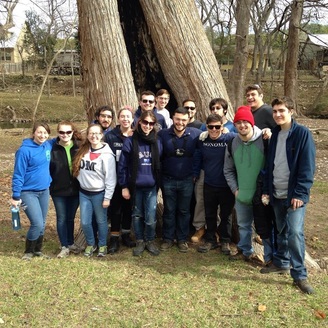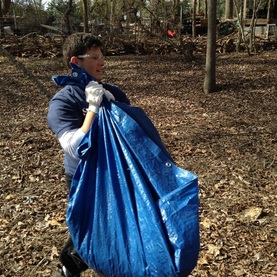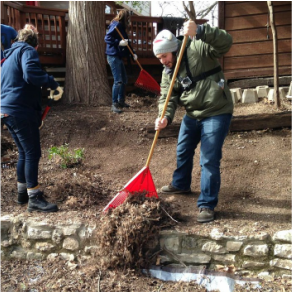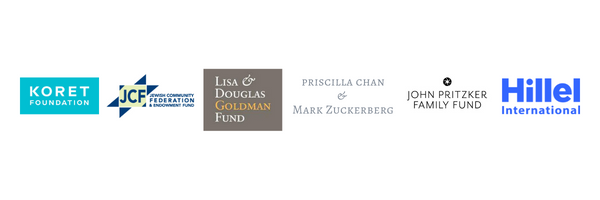|
In May, 2015, massive flooding devastated the Austin,Texas area. San Francisco Hillel has sent 7 students to contribute to the long-term recovery effort; here are their reflections.
Throughout Alternative Break, I’ve been honored to hear accounts from survivors, first responders, and volunteers what it was like to live through the horrendous 2015 floods. I’ve listened as they shared their stories of survival and pain, and I’ve worked hard to help in any small way I can while I’m here. I’m leaving this trip inspired that people have traveled here from every corner of the country, drawn together to Texas through empathy and the aim to do good for people who lost everything. As all the different narratives sink in, I keep reflecting on how the theme of unpredictability weaves these diverse perspectives and experiences together. Most natural disasters are almost wholly impossible to prepare for. Storms and flood water simply can’t be stopped. And therefore governments, both federal and local, have an enormous challenge in planning for and responding to the environmental, structural and human loss that follows. Again and again the Texans we spoke with echoed the same story: when the water came, no one could tell where it would go. And once people’s homes were gone, there was no sense of when they would get help. Many felt the government hand didn’t or couldn’t stretch far enough. Some of the survivors mentioned that so little government aid was given, that if third party organizations (like us) hadn’t stepped up to help in big ways they wouldn’t have been able to rebuild. It’s hard enough to lose your home; to be forced to pick up the pieces not knowing what resources are available to you seems altogether impossible. Another part of the San Marcos story, is the unpredictable way the storm turned strangers into community. So many people who wouldn’t have crossed paths without this tragedy were brought together across state and party lines. When faced with seemingly overwhelming challenges and uncertain futures, we’ve learned that tapping into our empathy creates the space for compassion, action and growth. In May, 2015, massive flooding devastated the Austin,Texas area. San Francisco Hillel has sent 7 students to contribute to the long-term recovery effort; here are their reflections.
This trip has opened my eyes in so many ways. However, one of the most powerful and surprising parts of this Alternative Break has been the opportunity to further bond with my SF Hillel community. When we all left California and began this journey to Texas, I didn’t anticipate how this experience would open each of us, and how every individual would bring a different strength and depth to the experience. At first, we seemed like a random bunch of students. Besides my fellow AEPi brothers, I didn’t know anyone else all that well. It took some effort and conversation, but soon we all found common ground and shared interests. Pretty soon, our group and the Hillel students from Illinois had meshed together into one Jewish micro-community of volunteers. Our bonds solidified through the time that we spent living together and accomplishing the tasks we were assigned on our work sites. Hearing tough stories from survivors, first responders, and those committed to the long term recovery allowed everyone to be more vulnerable and share. I believe because we had such a tight-knit group, we were able to motivate each other to accomplish as much as we could during our volunteering hours, and keep our spirits lifted as we worked to help rebuild homes, businesses, and communities. I’m looking forward to celebrating Shabbat together and volunteering with my AB cohort back home in San Francisco. I think we can take our experience here in Texas and influence our friends and connections to find their own ways to give back, so they too can see how transformative these experiences are for those who volunteer, not just those who need help. In May, 2015, massive flooding devastated the Austin,Texas area. San Francisco Hillel has sent 7 students to contribute to the long-term recovery effort; here are their reflections.
There’s a certain warmth that’s found within these Texas suburbs that is unlike anything I have ever experienced. Charm rolls off these “y’alls,” “ma’ams” and “sirs” that adds complexity to my assumptions about this place and these people. When I (a fashion-forward college student from one of the most urban, liberal areas of the country) first came to Texas (known for its cowboys, conservative politics, and college football) I was fearful there would be big cultural gap between me and the locals. I worried I would not be accepted into the community, even as a volunteer. On Wednesday night, I found myself in a “hole in the wall” saloon in the town of San Marcos. The place itself was almost intimidating, with its dim blue and red lights illuminating a dirty wooden floor, scattered with tables with obvious chipped paint. The lit side of the room revealed an empty stage with a single microphone. I sat down, hesitant, with all the Texas stereotypes running through my head. Then they came shuffling in. About a dozen men with guitars in hand slowly made their way to the stage, stopping just in front. They each found a chair they liked (which were arranged in a half circle, facing the audience) and plopped down. The room, besides these guitar-wielding men and our group of student volunteers, was practically empty. In May, 2015, massive flooding devastated the Austin,Texas area. San Francisco Hillel has sent 7 students to contribute to the long-term recovery effort; here are their reflections.
Last night, I was reminded of the importance of community. As most of you know there were terrible floods in Texas this past year. The town of Wimberly was devastated with two major floods within a period of five months – making it the first time in our nation’s history a single town has experienced two federal-issued natural disaster warnings. While the rush of the water tore structures down, it also built a sense of communal responsibility. Our group had the chance to meet with six local community members who were directly affected by the disaster: a fireman, retired law enforcement, volunteer organizers, and storm survivors. We learned Wimberley is usually divided by opposing political beliefs, yet, in a time of emergency they joined forces to recover from the flood together.The locals spoke of having to go beyond their comfort zones and discovering new passions by partaking in the relief effort. For example, one woman who said she usually stays at home and quilts, decided she needed to help her neighbors. She provided food for the first responders and volunteers all day and night, for months. In May, 2015, massive flooding devastated the Austin,Texas area. San Francisco Hillel has sent 7 students to contribute to the long-term recovery effort; here are their reflections.
Our morning begins with the usual banter you can expect from a bunch of college guys sharing a cabin. Our joking and teasing starts our day with a laugh and helps get us up and ready for our first day of work in San Marcos, Texas. After breakfast, we pile into our vans and absorb our first glimpses of the devastation left by last year’s floods. We drive across bridges that were once completely covered by 42 feet of water. Surrounding us are basins whose walls were weathered by the unforgiving currents of the floods. A gallon of water weighs eight pounds. This powerful natural element caused unfathomable flooding, leading to millions of dollars of damage, 350 injuries, and eleven deaths. And here we are, driving down a road that was completely submerged seven months ago. We arrive at our first worksite for the day, the Creekhaven Inn. We are greeted by a gentle giant of a man named Harold. He appears camera shy when he notices my GoPro, and quietly assigns us our duties around the Inn. Even though 80% of the work on the building seems completed, the destruction and debris scattered around remind us what happened here. Entire roots of trees are exposed. “Water goes where it wants to go,” says Harold. And that phrase is what sticks in my mind and dominates my thoughts throughout the day. Harold tells us that tourism is the backbone of the entire local economy, and the recovery of this Inn is a priority for the state. This is where you can check out what our community is thinking and doing. Have something to say? Email Rachel with your cool idea.
|
AboutCheck out what our community is thinking and doing. Archives
August 2023
Categories |
CONNECT WITH Us
We are supported through meaningful communal donations and our very generous Funders.




 RSS Feed
RSS Feed
